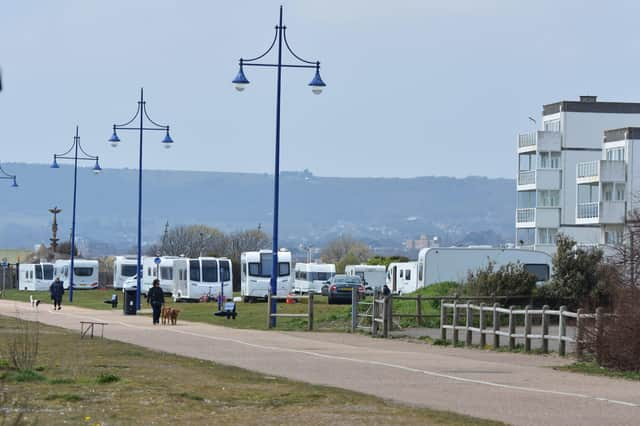Travellers pitch up on Eastbourne seafront – what are their rights and what can authorities do?


The group – including several vehicles, motorhomes and caravans – arrived on the seafront on Tuesday evening (April 20).
Several bollards appear to have been removed to gain access to the open grassland area by the Sovereign Centre and Monarch House flats.
Advertisement
Hide AdAdvertisement
Hide AdThere are at least 15 vehicles on the site and more than 50 adults and children.
They are believed to have originated from Ireland.
Police and council officials have visited the encampment but no official notice has yet been served asking the group to leave.
The Herald understands that Sussex Police has not issued a Section 61 notice to move the group on.
Here we look at travellers’ rights and what the authorities can do...
Who are Gypsies and travellers?
Advertisement
Hide AdAdvertisement
Hide AdGypsies and travellers travel the country as part of a nomadic way of life.
As with any other individual, all gypsies and travellers have rights under the 1998 Human Rights Act.
Romany Gypsies and Irish Travellers are also protected against discrimination on the basis of their ethnic origins under the 2010 Equalities Act.
In 2014, Amnesty International estimated there were 200,000-300,000 Gypsy and Irish Travellers in the UK.
What is an unauthorised encampment?
Advertisement
Hide AdAdvertisement
Hide AdThis is when a group of people with vehicles trespass on land with the plan to reside there without the owner’s consent. This is a civil matter not a criminal offence.
What must the council do?
The council will check to see how tidy the site is, how much it is disrupting local residents and businesses, and whether it is obstructing highways or public rights of way.
The council must also check the general health and welfare of the group and the children’s education.
Usually the council will try to negotiate a leaving date with the travellers rather than having to go down the more costly court route.
Advertisement
Hide AdAdvertisement
Hide AdHowever, if this is not possible, the council must follow a set procedure which involves proving ownership of the land, giving details of the illegal encampment, and then serving notices and summonses in order to successfully obtain a court order to evict the travellers from the site.
What can you do if they are on private land?
If they are camped on private land without the landowner’s permission it is the landowner’s responsibility to prevent it and evict them. This can be done by asking them to leave and by starting court proceedings.
What can the police do?
Police will visit sites reported to them and if there are six or more vehicles, officers can use powers under section 61 of the Criminal Justice and Public Order Act 1994.
They will take action if criminal activity, public disorder or disruption to the local community can be established.